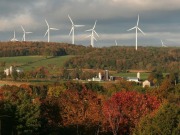"Robin Whitlock
Friday, 29 March 2013
Government figures reveal that 11.3 percent of UK electricity demand in 2012 was generated by renewable energy
Government figures reveal that 11.3 percent of UK electricity demand in 2012 was generated by renewable energy

Renewable energy generation in 2012 was up by 20 percent on the previous year according to government figures, thereby confirming the strong performance of renewables within the wider UK energy network. 11.3 percent of the country’s electricity supply was generated by renewables last year and 12.5 percent in the fourth quarter.
Much of the growth in the sector has been achieved by new on and offshore wind farms in spite of lower than average wind speeds over the course of the year. 2012 was also fairly dry which acted to reduce the output from hydro, however biomass generation increased by 17 percent, thanks largely to Tilbury’s conversion to biomass, while solar PV capacity increased by 70 percent to 1.7GW. The total UK renewable energy power capacity now stands at 15.5GW.
Much of the growth in the sector has been achieved by new on and offshore wind farms in spite of lower than average wind speeds over the course of the year. 2012 was also fairly dry which acted to reduce the output from hydro, however biomass generation increased by 17 percent, thanks largely to Tilbury’s conversion to biomass, while solar PV capacity increased by 70 percent to 1.7GW. The total UK renewable energy power capacity now stands at 15.5GW.
